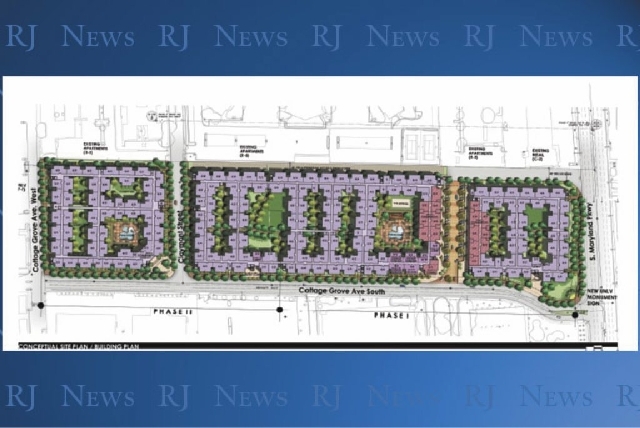UNLV gets nod to build new student housing

Upperclassmen and graduate students at the University of Nevada, Las Vegas might be able to enjoy a different kind of living starting in fall 2015.
The Nevada Board of Regents voted Friday to approve a preliminary agreement for the proposed public-private $175 million Midtown Park Project, which includes redevelopment of a 14-acre site directly north of campus for modern, apartment-style student housing.
“They won’t be your typical dorm,” UNLV President Neal Smatresk said.
The approval of the preliminary agreement is the first of many steps and starts to shape the proposed project.
UNLV plans to buy the 14-acre site for $17 million. American Nevada Company and the Vista Group own the property, called the University Park Apartment Complex. The university plans to lease the land at no cost for 35 years to Educational Facilities Development Services, LLC, which will finance, build and operate the project.
T he university would be able to market and lease the new apartments to students, keeping 3.5 percent of the gross rental income to cover costs.
UNLV’s will pay for the land with
$8.3 million from a land acquisition fund that was established in 2000 and $2.9 million from the Rainbow Gardens account — money from property sold to the federal government for just under
$7.5 million in 2005, Gerry Bomotti, senior vice president for finance and business at UNLV, said.
Some $4 million would come from capital improvement fees, and the rest would come from overhead fees from self-supported facilities on campus, such as housing and the student union.
“It’s a great location for student housing,” Bomotti said. “We feel good about the partners we have here. We feel they can deliver a good product.”
The American Nevada Company and the Vista Group began to manage the university’s campus housing in January.
All dorms are full for the first time in a decade, and there’s a waiting list, Smatresk said. “We are now once again back into a growing” phase, he said. “The need for residential housing is rising.”
About 15 percent of the tenants of the 280-unit University Park Apartments are UNLV students, Bomotti said. After the redevelopment, the goal is to be
100 percent student-occupied.
For the first phase of the project, units on the east side of the site will be demolished, he said. Two-thirds of the site will be redeveloped, adding 1,900 to 2,000 beds available for students in fall 2015.
Another 1,000 beds would be added in nine years, based on need, Bomotti said.
Michael Saltman, president of the Vita Group, said the concept for the project began six or seven years ago, but it stalled because of the recession.
“This is an emotional day,” he said. “This is quite a milestone.”
But the proposal didn’t get the green light without being criticized. Regent Allison Stephens said the university just went through a time of budget shortfalls, which was felt by students as well.
“Somehow we always come up with money on the eleventh hour for some project,” she said.
If UNLV chose to stop the project, it would pay 50 percent of costs acquired by the American Nevada Company and the Vista Group, with a cap of up to $250,000, Bomotti said. If they move forward, the improvements would become university property after 35 years, if not earlier.